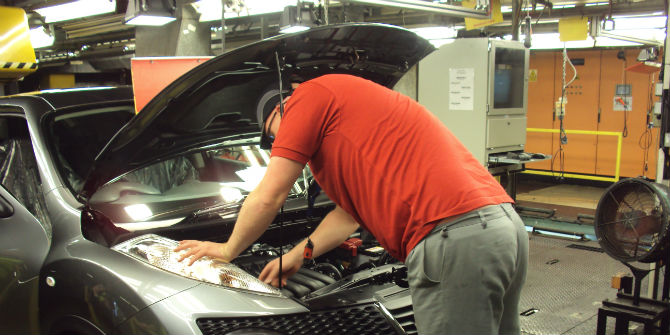 Amid the rows about EU migrants and the economic impact of a Brexit, let’s not overlook the incredible achievements of the EU, writes Simon Hix. The single market is not just a matter of ‘free trade’ – it enables the free movement of people, goods and capital between 28 countries, something we now take for granted. The EU is still too technocratic and unaccountable, though it has taken great strides to improve that over the past decade. But now is the opportunity for the UK – with the help of Scandinavian and Visegrad allies – to further liberalise the single market and re-energise the EU project.
Amid the rows about EU migrants and the economic impact of a Brexit, let’s not overlook the incredible achievements of the EU, writes Simon Hix. The single market is not just a matter of ‘free trade’ – it enables the free movement of people, goods and capital between 28 countries, something we now take for granted. The EU is still too technocratic and unaccountable, though it has taken great strides to improve that over the past decade. But now is the opportunity for the UK – with the help of Scandinavian and Visegrad allies – to further liberalise the single market and re-energise the EU project.
The debate about whether we should Leave or Remain in the EU has mostly focused on a few narrow issues, such as a possible economic downturn in the few years after we left, or if immigration numbers might come down by a few tens of thousands (I say this because we already have more migration to the UK from outside the EU, so restricting the number of EU migrants would not have a major impact on total immigration numbers). These are important issues, of course. But, to my mind, they miss the bigger picture, which relates to what the EU represents in broad historical terms.

From this perspective, the European integration project has been one of the most successful and powerful liberalising projects in human history. Complete removal of barriers to the free movement of goods, services, capital and labour between 28 countries and over 500 million people in a ‘single market on a continental scale’ is an incredible achievement. This achievement is often underestimated, as we take for granted the social, economic, employment, education, consumption, travel and numerous other opportunities we now have as a result of the single market. A single market is qualitatively completely different to “free trade”, which is simply an agreement to trade in a sub-set of goods (as services are usually excluded from free trade agreements), and hence is a rather limited form of free interaction between people.
The EU has also spread democracy and human rights, including gender equality and gay rights throughout our continent. The EU has expanded the minimum protection of workers, including paid holiday leave and maternity and paternity rights. The EU has established high environmental standards in the face of global corporations who have powerful incentives to try to push these down to the lowest level possible. And the EU has led the way in liberalising world trade, via the push for zero tariffs in the World Trade Organisation and the EU’s network of global free-trade agreements. The comparison with the United States is striking here, in that powerful US business interests are increasingly pushing for restricting free world trade and fighting against global social and environmental standards rather than promoting them.
Many other regions of the world – such as South America, South East Asia, Central America, the Caribbean, and West Africa – have the aspiration to create an EU-style single market on a continental scale, but none has yet been able to move beyond a very limited free trade agreement, mainly because of petty nationalist squabbles and protectionist interests.
Admittedly, the EU institutions are not as democratic or accountable as they could or should be, and too much of the EU is technocratic and bureaucratic. Indeed, I have taught and written about these issues for much of my academic career (for example in my book What’s Wrong With the EU and How to Fix It). But even on these issues the EU is much better now than it was 10 or 15 years ago: with more checks-and-balances, more powers for national parliaments to scrutinise and block EU laws, a court which is more willing to strike down EU laws for breaching subsidiarity principles, far more constraints on powerful business lobbies and other vested interests, a much smaller budget (less than 1% of EU GDP now, and with huge cuts to agriculture price support), and a Commission appointment procedure which is starting to become genuinely contested – via rival candidates for the EU’s ‘top job’ ahead of European Parliament elections (it is not the EU’s fault that British party leaders unilaterally opted out of this contest in the 2014 elections).
And, by the way, if the EU was genuinely more directly “democratic”, for example with a directly-elected “European President”, this would be a huge federalising step, which many people are not ready for.
It is also my firm belief that many of the EU’s liberalising achievements are due to the role the UK has played, with like-minded countries, for example in pushing for the single market programme, the liberalisation of goods and services markets, and enlargement to 28 countries. Instead of retreating to the sidelines, the UK should be thinking about how to rebuild a “liberal coalition” – an Anglo-Scandic-Benelux-Visegrad alliance – to re-energise Europe’s liberalising and democratising project. For example, there needs to be more liberalisation of the European services market, a far more decentralised and flexible regulatory structure in the single market, and more creative ways to engage citizens and national parliamentarians in EU politics.
If the UK withdraws, the liberal democratic project for Europe will become marginalised, as the EU will become dominated by the corporatist and bureaucratic instincts of some of the French and German elites and the politics of the growing populist right movements. This would have a huge impact on the UK, as the EU’s single market would continue to be our dominant trading partner and we would inevitably have to apply EU single market rules to be able to sell our goods and services to the continent. Put simply, whether we are inside or outside the EU we will continue to trade more with Germany than the US, more with Italy than India, more with Belgium than Australia, more with the Netherlands than New Zealand, more with Sweden than Canada, and so on, because geographic closeness is by far the biggest predictor of trade patterns.
And do not kid ourselves that the UK outside the EU could lead a globally socially liberal world. The US certainly doesn’t have much appetite for that, and neither do the rising powers of China, Russia and India. It is supreme arrogance to think that Britain can ‘punch its weight’ in a globalising world alongside the US, the EU, China, India and Russia, and the numerous other emerging global players.
So, let’s stop focussing exclusively on narrow short-term concerns, and start considering the longer and broader political and economic meaning of what we have managed to create in our small corner of this planet.
This post represents the views of the author and not those of the BrexitVote blog, nor the LSE.
Simon Hix is a Professor of Political Science at the London School of Economics and Political Science.







I would like to add the following commentary from a Greek citizen who has come to live and work in the UK.
The commentary poses many questions about migration.
My name is John Baxevanidis.
I came to the UK to avoid national service, I am a “fun” of academia, I have attended 3 Universities and equally obtained 3 degrees including 2 Master’s degrees in the process. I was born in Greece and brought up by my very poor single mother. I went to a “run of the mill” state school until I was 17 where I barely graduated by the skin of my teeth. I had never made the slightest effort to study until that point in my life. At the age of 18 I came to the UK. Now I am a “top earner” (according to the statistics), drive an expensive car, but live in a small 3 bed detached house.
I consider myself to be “from the block”, yet at the same time much more cultured, educated and informed than most people I know. I know a lot of young people who have no dreams, no aspirations and consequently they are going nowhere. However, they belong to a “social class” higher than mine. Can you connect the dots? There were no opportunities presented to me at any moment in my life. My parents and I “forced” them. Cultural and geographical idiosyncrasies play a huge role. So yes in median/average/statistical terms there are hundreds of different factors that “micro-affect” and “micro-influence” classes. People tend to stick to where they are (in statistical terms at least) because they are not allowed by “society” to go anywhere else. This is a “macro” factor. I’m a cynic and a realist and I do not believe any time soon that “society” will ever allow equality or freedom. If you want to explore the answer to your question, you have to go back in history to understand it better.
Do you really, truly think that a different tax system, policy or law will eliminate this problem? Think with your heart not your calculator and you will probably realise that it will not make much difference.
Do the starving and the diseased have equal opportunities in this world? Why is that? What is the social and economic class of a thousand generations born in poverty, disease or war? But I know this is a different kettle of fish because I am referring to an entirely different group of people…different demographics…different “statistical groups”, blah, blah, hence let’s not talk about them…
This country has an educational system which is presented by society as “one of the best”. Yet if you speak to foreign people in education (school or university) will testify that the level of education in England at least (as I am not aware of the rest of the UK) is very poor. Schools dish out “tripple” A’s or double stars or whatever, like shops give out flyers in the streets, yet children are still just about literate in comparison with other countries. I am not just exaggerating for a humorous effect, I have met plenty of such kids and University graduate later on, who lag just as much in their abilities and knowledge. When I did my first degree in the University of Manchester most of the English students had to go to “night school” to learn basic maths before proceeding with the rest of the class. The university already had this facility, aware of the lack of knowledge. Don’t get me wrong, England still breeds fantastic scientists and brilliant minds, but we are talking about the average and statistical here after all.
There is no recipe for the road to success. Academia loves boxes and statistics and graphs, etc. What makes you as a person? Your social class, your education, your salary, your parents’ wealth, your manners, your empathy towards others, your religion, the car you drive? Why do we care about social mobility? (I know most do, it’s rhetorical question) Our “care and concern” about social and economic mobility is what pushes people further into extremism, vanity, but also apathy. Who says that going up will make you happy? Success is measured differently by everybody
There is no mention here of the fundamental problem facing the Eurozone, namely that much deeper fiscal integration is needed, yet the peoples of North Western Europe do not want it:
http://posnetres.blogspot.co.uk/2016/06/can-eurozone-survive.html